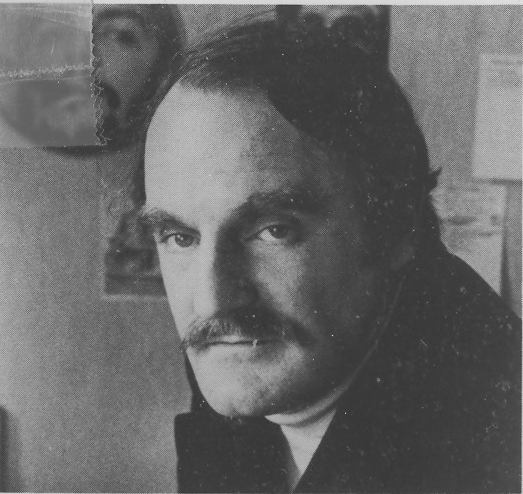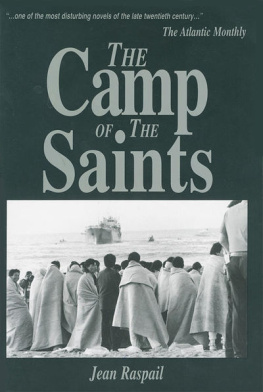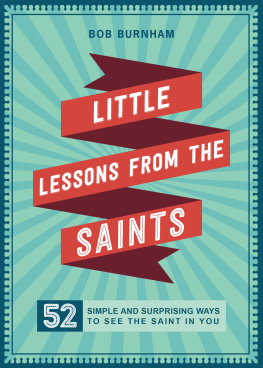Raspail Jean - The Camp of the Saints
Here you can read online Raspail Jean - The Camp of the Saints full text of the book (entire story) in english for free. Download pdf and epub, get meaning, cover and reviews about this ebook. City: Petoskey, Mich., year: 1995, publisher: Social Contract Press, genre: Romance novel. Description of the work, (preface) as well as reviews are available. Best literature library LitArk.com created for fans of good reading and offers a wide selection of genres:
Romance novel
Science fiction
Adventure
Detective
Science
History
Home and family
Prose
Art
Politics
Computer
Non-fiction
Religion
Business
Children
Humor
Choose a favorite category and find really read worthwhile books. Enjoy immersion in the world of imagination, feel the emotions of the characters or learn something new for yourself, make an fascinating discovery.
- Book:The Camp of the Saints
- Author:
- Publisher:Social Contract Press
- Genre:
- Year:1995
- City:Petoskey, Mich.
- Rating:3 / 5
- Favourites:Add to favourites
- Your mark:
- 60
- 1
- 2
- 3
- 4
- 5
The Camp of the Saints: summary, description and annotation
We offer to read an annotation, description, summary or preface (depends on what the author of the book "The Camp of the Saints" wrote himself). If you haven't found the necessary information about the book — write in the comments, we will try to find it.
The Camp of the Saints — read online for free the complete book (whole text) full work
Below is the text of the book, divided by pages. System saving the place of the last page read, allows you to conveniently read the book "The Camp of the Saints" online for free, without having to search again every time where you left off. Put a bookmark, and you can go to the page where you finished reading at any time.
Font size:
Interval:
Bookmark:

Jean Raspail was born in 1925, and since 1949 he has traveled across the world: Peru, Japan, the Congo, Israel, Hong Kong and Macao Out of the experience has emerged his most characteristic writing: a classic (and controversial) account of the West Indies, Secouons le cocotier; two novels, Le vent des pins (translated into nine languages) and Les veuves de Santiago; and a collection of stories, Le Tam-tam de Jonathan. In 1970 the Acadmie Francaise awarded him its Jean-Walther Prize for the whole of his work.

Norman Shapiro was born in Boston, educated at Harvard University and the Universit dAix-Marseille, and is currently Professor of Romance Languages and Literatures at Wesleyan University. His translations include Ngritude: Black Poetry from Africa and theCaribbean, Four Farces of Georges Feydeau (which was nominated for a National Book Award), Karnouraska by Anne Hbert, and Virginie, or the Dawning of the World by Joseph Majault.
And when the thousand years are ended, Satan will be released from his prison, and will go forth and deceive the nations which are in the four corners of the earth, Gog and Magog, and will gather them together for the battle; the number of whom is as the sand of the sea. And they went up over the breadth of the earth and encompassed the camp of the saints, and the beloved city.
APOCALYPSE 20
My spirit turns more and more toward the West, toward the old heritage. There are, perhaps, some treasures to retrieve among its ruins I dont know.
LAWRENCE DURRELL
As seen from the outside, the massive upheaval in Western society is approaching the limit beyond which it will become meta-stable and must collapse.
SOLZHENITSYN
I HAD WANTED TO WRITE a lengthy preface to explain my position and show that this is no wild-eyed dream; that even if the specific action, symbolic as it is, may seem farfetched, the fact remains that we are inevitably heading for something of the sort. We need only glance at the awesome population figures predicted for the year 2000, i.e., twenty-eight years from now: seven billion people, only nine hundred million of whom will be white.
But what good would it do?
I should at least point out, though, that many of the texts I have put into my characters mouths or penseditorials, speeches, pastoral letters, laws, news stories, statements of every descriptionare, in fact, authentic. Perhaps the reader will spot them as they go by. In terms of the fictional situation I have presented, they become all the more revealing.
J.R.
The old professor had a rather simple thought. Given the wholly abnormal conditions, he had read, and reasoned, and even written too muchversed as he was in the workings of the mindto dare propose anything, even to himself, but the most banal of reflections, worthy of a schoolboys theme. It was a lovely day, warm but not hot, with a cool spring breeze rolling gently and noiselessly over the covered terrace outside the house. His was one of the last houses up toward the crest of the hill, perched on the rocky slope like an outpost guarding the old brown-hued village that stood out above the landscape, towering over it all, as far as the tourist resort down below; as far as the sumptuous boulevard along the water, with its green palms, tips barely visible, and its fine white homes; as far as the sea itself, calm and blue, the rich mans sea, now suddenly stripped of all the opulent veneer that usually overspread its surfacethe chrome-covered yachts, the muscle-bulging skiers, the gold-skinned girls, the fat bellies lining the decks of sailboats, large but discreetand now, stretching over that empty sea, aground some fifty yards out, the incredible fleet from the other side of the globe, the rusty, creaking fleet that the old professor had been eyeing since morning. The stench had faded away at last, the terrible stench of latrines, that had heralded the fleets arrival, like thunder before a storm. The old man took his eye from the spyglass, moved back from the tripod. The amazing invasion had loomed up so close that it already seemed to be swarming over the hill and into his house. He rubbed his weary eye, looked toward the door. It was a door of solid oak, like some deathless mass, jointed with fortress hinges. The ancestral name was carved in somber wood, and the year that one of the old mans forebears, in uninterrupted line, had completed the house: 1673. The door opened out on the terrace from the large main room that served as his library, parlor, and study, all in one. There was no other door in the house. The terrace, in fact, ran right to the road, down five little steps, with nothing like a gate to close them off, open to any and every passerby who felt like walking up and saying hello, the way they did so often in the village. Each day, from dawn to dusk, that door stood open. And on this particular evening, as the sun was beginning to sink down to its daily demise, it was open as wella fact that seemed to strike the old man for the very first time. It was then that he had this fleeting thought, whose utter banality brought a kind of rapturous smile to his lips: I wonder, he said to himself, if, under the circumstances, the proverb is right, and if a door really has to be open or shut
Then he took up his watch again, eye to glass, to make the most of the suns last, low-skimming rays, as they lit the unlikely sight one more time before dark. How many of them were there, out on those grounded wrecks? If the figures could be believedthe horrendous figures that each terse news bulletin had announced through the day, one after anotherthen the decks and holds must be piled high with layer on layer of human bodies, clustered in heaps around smokestacks and gangways, with the dead underneath supporting the living, like one of those columns of ants on the march, teeming with life on top, exposed to view, and below, a kind of ant-paved path, with millions of trampled cadavers. The old professorCalgues by nameaimed his glass at one of the ships still lit by the sun, then patiently focused the lens until the image was as sharp as he could make it, like a scientist over his microscope, peering in to find his culture swarming with the microbes that he knew all the time must be there. The ship was a steamer, a good sixty years old. Her five stacks, straight up, like pipes, showed how very old she was. Four of them were lopped off at different levels, by time, by rust, by lack of care, by chancein short, by gradual decay. She had run aground just off the beach, and lay there, listing at some ten degrees. Like all the ships in this phantom fleet, there wasnt a light to be seen on her once it was dark, not even a glimmer. Everything must have gone deadboilers, generators, everything, all at onceas she ran to meet her self-imposed disaster. Perhaps there had been just fuel enough for this one and only voyage. Or perhaps there was no one on board anymore who felt the need to take care of such thingsorof anything elsenow that the exodus had finally led to the gates of the newfound paradise. Old Monsieur Calgus took careful note of all he saw, of each and every detail, unaware of the slightest emotion within him. Except, that is, for his interest; a prodigious interest in this vanguard of an antiworld bent on coming in the flesh to knock, at long last, at the gates of abundance. He pressed his eye to the glass, and the first things he saw were arms. As best he could tell, his range of vision described a circle on deck ten yards or so in diameter. Then he started to count. Calm and unhurried. But it was like trying to count all the trees in the forest, those arms raised high in the air, waving and shaking together, all outstretched toward the nearby shore. Scraggy branches, brown and black, quickened by a breath of hope. All bare, those fleshless Gandhi-arms. And they rose up out of scraps of cloth, white cloth that must have been tunics once, and togas, and pilgrims saris. The professor reached two hundred, then stopped. He had counted as far as he could within the bounds of the circle. Then he did some rapid calculation. Given the length and breadth of the deck, it was likely that more than thirty such circles could be laid out side by side, and that between every pair of tangent circumferences there would be two spaces, more or less triangular in shape, opposite one another, vertex to vertex, each with an area roughly equal to one-third of a circle, which would give a total of 30 + 10 = 40 circles, 40 x 200 arms = 8,000 arms. Or four thousand bodies! On this one deck alone! Now, assuming that they might be several layers thick, or at least no less thick on each of the decksand between decks and belowdecks toothen the figure, astounding enough as it was, would have to be multiplied by eight. Or thirty thousand creatures on a single ship! Not to mention the dead, floating here and there around the hull, trailing their white rags over the water, corpses that the living had been throwing overboard since morning. A curious act, all in all, and one not inspired by reasons of hygiene, to be sure. Otherwise, why wait for the end of the voyage? But Monsieur Calgues felt certain he had hit on the one explanation. He believed in God. He believed in all the rest: eternal life, redemption, heavenly mercy, hope and faith. He believed as well, with firm conviction, that the corpses thrown out on the shores of France had reached their paradise too to waft their way through it, unconstrained, forevermore. Even more blessed than the living themselves, who, throwing them into the sea, had offered their dead, then and there, the gift of salvation, joy, and all eternity. Such an act was called love. At least that was how the old professor understood it.
Font size:
Interval:
Bookmark:
Similar books «The Camp of the Saints»
Look at similar books to The Camp of the Saints. We have selected literature similar in name and meaning in the hope of providing readers with more options to find new, interesting, not yet read works.
Discussion, reviews of the book The Camp of the Saints and just readers' own opinions. Leave your comments, write what you think about the work, its meaning or the main characters. Specify what exactly you liked and what you didn't like, and why you think so.











